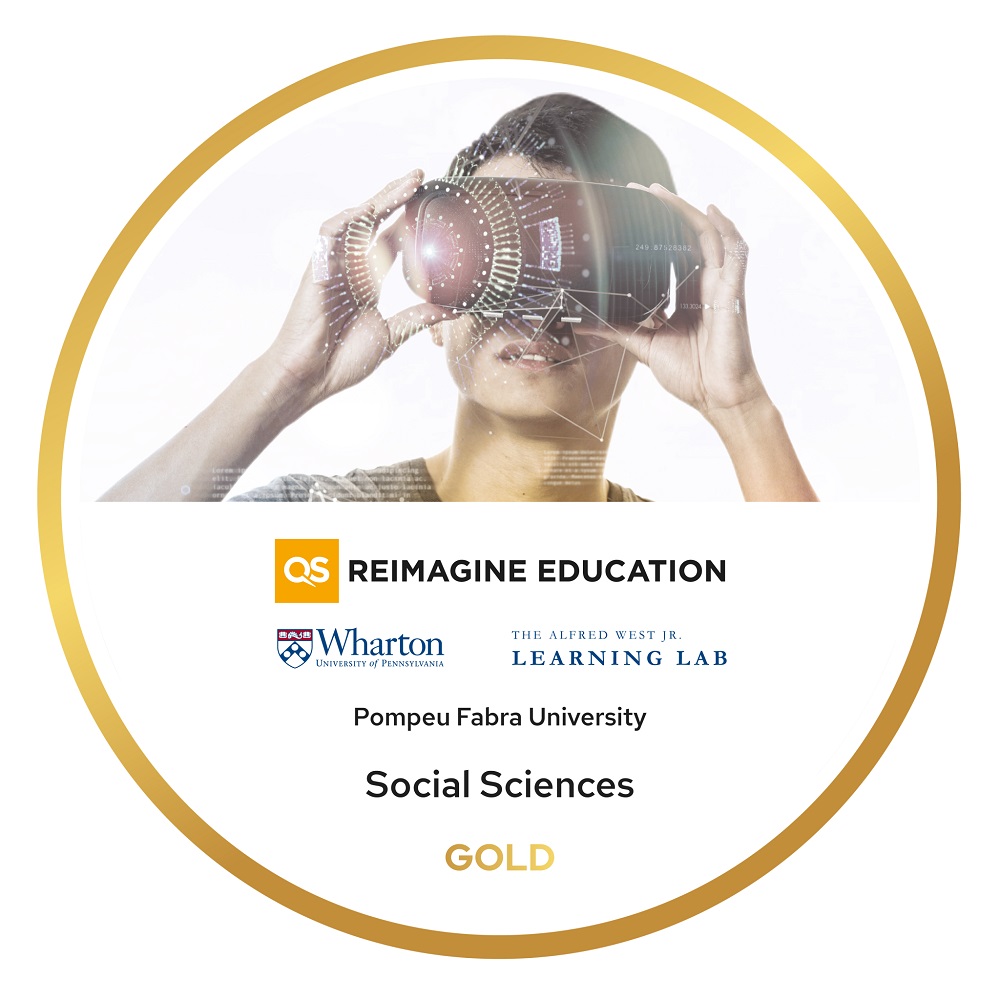The UPF Planetary Wellbeing project wins Gold for Social Sciences at the Reimagine Education Wharton-QS 2021 awards
The UPF Planetary Wellbeing project wins Gold for Social Sciences at the Reimagine Education Wharton-QS 2021 awards
The UPF Planetary Wellbeing project wins Gold for Social Sciences at the Reimagine Education Wharton-QS 2021 awards
Considered the “Oscars” of education, these awards, which were presented during a virtual conference held between 6 and 10 December, acknowledged the University’s initiative “for its international programme to generate and convey new knowledge on the concept of planetary wellbeing”

Planetary Wellbeing, a project launched by UPF at the end of 2017 with a commitment to the major challenges of a global society, has recently won the Gold Award in the Social Sciences category, at the Reimagine Education Wharton-Quacquarelli Symonds (QS) 2021 conference and awards, which recognized it “for its international programme to generate and convey new knowledge on the concept of planetary wellbeing”.
These awards, convened by the Wharton School and Quacquarelli Symonds (QS), the company that produces one of the world’s leading university rankings, are considered the “Oscars” of education, and were presented during a virtual conference which took place between 6 and 10 December. The awards, to which more than 1,100 projects were submitted in more than 25 categories, reward innovative approaches that enhance student learning outcomes and employability. Some of the features that the jury has taken into account when evaluating the candidacies are their approach, impact, scalability, comparison with other competitors, and uniqueness.
Lela Mélon: “It is recognition for the work we have done to ensure global wellbeing through all UPF activities and its internal and external organic transformation to become a sustainable institution”
Lela Mélon, executive director of the project UPF Planetary Wellbeing and professor of Sustainability in Business Law at ESCI-UPF, emphasizes the importance of this distinction: “The QS Reimagine Education Awards are the “Oscars” in the field of education, and we are more than excited that in less than four years of our institutional project’s existence we have been awarded first place in the social sciences category. It is recognition for the work we have done to ensure global wellbeing through all UPF activities and its internal and external organic transformation to become a sustainable institution”. And she adds: “We are excited to continue working on this project in the coming years and to maintain a direct and indirect positive impact on the transformation towards a welfare society”.
Planetary Wellbeing, a commitment by UPF to the major challenges of the 21st century
At the end of 2017, Jaume Casals, former UPF rector, announced the University’s desire to promote transversal, multidisciplinary and interdisciplinary action in the field of Planetary Wellbeing in order to provide the institution with a vision committed to the major challenges of the global society in the 21st century and, at the same time, generate transformative energies of the University itself and of the urban environment in which it is situated, the city of Barcelona.
The proposal, coordinated by the lecturers Josep Lluís Martí, currently UPF commissioner for Planetary Wellbeing, and Josep Maria Antó, scientific director of ISGlobal, was born with the main goal of contributing to the knowledge and understanding of the set of complex, interrelated and systemic problems facing human, animal and planetary wellbeing, as a global ecosystem, and to the identification of integrated, innovative and interdisciplinary solutions to these problems. During these four years, within the framework of the project UPF has developed a series of actions and initiatives in the fields of teaching, research and transfer, dissemination and advancement in the United Nations sustainable development goals (SDGs).
A global competition to improve in educational innovation
“Reimagine Education” is a global conference and competition open to educational innovators. It gathers startups in the field of educational technologies, prestigious academics, innovation managers, university leaders and other actors interested in the future of teaching and learning in higher education. The conference and awards encourage educators around the world to identify problems that impede optimal learning and pedagogical outcomes, and to find creative and innovative solutions to these problems.
The winners of the two overall categories of the competition, who each receive $25,000 in prizes, were as follows: the Global EdTech Award went to Ubongo International, for the Ubongo Kids project, which gives access to education for millions of children through new technologies; and the Global Education Award was won by the Queensland University of Technology (QUT) for the “QUT Design for Impact” project, an innovative pedagogical approach that links students to the industrial and professional field.
In the Social Sciences category, won by UPF, the Silver went to the project “The Voice of Community: A Storytelling Approach”, by the University of Liberal Arts Bangladesh (ULAB), while the Bronze was awarded to the” Virtual Housekeeping” project by EHL Hospitality School.
